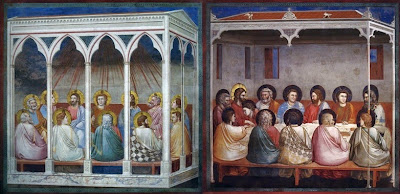Desparatio
I'm beginning this with a longer-than-usual quote defining despair because I think it's important to understand what it is and what it isn't.
Despair, ethically regarded, is the voluntary and complete abandonment of all hope of saving one's soul and of having the means required for that end. It is not a passive state of mind: on the contrary it involves a positive act of the will by which a person deliberately gives over any expectation of ever reaching eternal life. There is presupposed an intervention of the intellect in virtue of which one comes to decide definitely that salvation is impossible. This last is motivated by the persuasion either that the individual's sins are too great to be forgiven or that it is too hard for human nature to cooperate with the grace of God or that Almighty God is unwilling to aid the weakness or pardon the offenses of his creatures, etc.
It is obvious that a mere anxiety, no matter how acute, as to the hereafter is not to be identified with despair. This excessive fear is usually a negative condition of soul and adequately discernible from the positive elements which clearly mark the vice which we call despair. The pusillanimous person has not so much relinquished trust in God as he is unduly terrified at the spectacle of his own shortcomings of incapacity.
Despair as such and as distinguished from a certain difference, sinking of the heart, or overweening dread is always a mortal sin. Catholic Encyclopedia
There is, too, another still more objectionable sort of dejection, which produces in the guilty soul no amendment of life or correction of faults, but the most destructive despair: which did not make Cain repent after the murder of his brother, or Judas, after the betrayal, hasten to relieve himself by making amends, but drove him to hang himself in despair. Institutes, Book IX, John Cassian
The first commandment is also concerned with sins against hope, namely, despair and presumption: (1864) By despair, man ceases to hope for his personal salvation from God, for help in attaining it or for the forgiveness of his sins. Despair is contrary to God’s goodness, to his justice—for the Lord is faithful to his promises—and to his mercy. Catechism of the Catholic Church, #2091
Despair seems to have let go of all hope. Her hands are clenched but holding on to nothing. Her hair is loose. Unfortunately, this picture seems to have been deliberately defaced. The sash from which she hangs is almost totally obliterated, as is her face. What's all too clear, though, it that demon who has come to snatch her immediately to hell. Even though he has been partially damaged, there is no mistaking his malice. Look at that claw in her hair.
The visible part of the inscription reads:
Instar cordis desperati Sathan ducta suffocati/Et gehenne sic dampnati tenet haec figura.
My friend, Paul Arblaster, translates this as, "This figure holds the image of a desperate heart suffocated by Satan's leadership and so damned to Hell." That is so very sad.
Most of the people that we know who seem to be despairing, and even those who commit suicide, are not really committing the sin of despair, which, as the definition says, is a very deliberate choice. They are suffering from that anxiety that the quote describes. Still, every once in a great while, I have met someone who is deliberately rejecting hope--almost setting up their own sins as idols. It's chilling.
Instead of posting about Charity next, I'm going to change my usual order and post on Envy next. Envy is very nasty indeed, and I don't want to end on that note, and I also wanted to save the best for last.
AMDG

















































